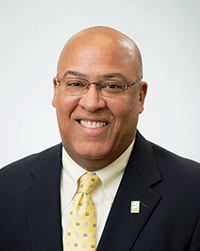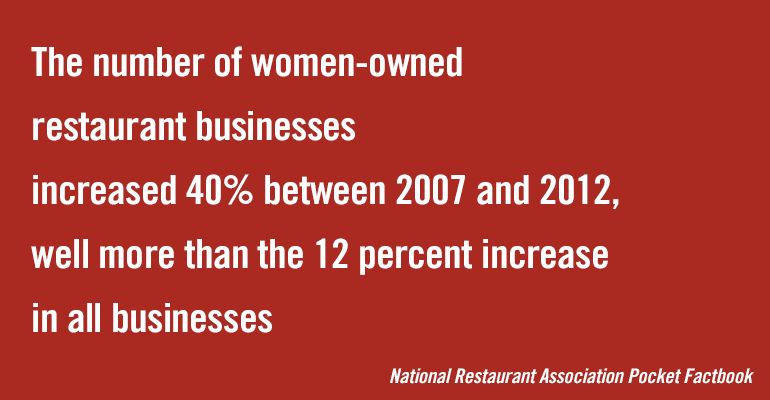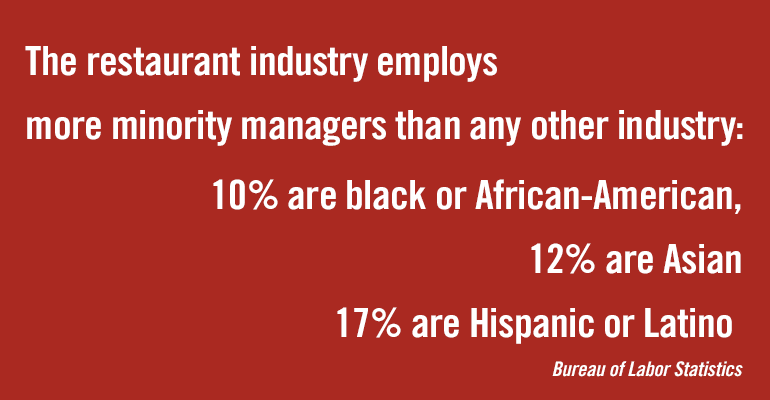While the restaurant workforce and customer base continue to become more diverse, the restaurant company executive suites appear to be slipping the other direction.
Several restaurant companies support corporate programs to identify and groom diversity for senior leadership, but the executive positions remain elusive for business people of color.
 “Leadership at the officer level and C-suite remains an ongoing challenge for our industry,” said Gerry Fernandez, founder and president of the Multicultural Foodservice & Hospitality Alliance.
“Leadership at the officer level and C-suite remains an ongoing challenge for our industry,” said Gerry Fernandez, founder and president of the Multicultural Foodservice & Hospitality Alliance.
“The foodservice industry is a viable career opportunity for people of color, and this is perhaps best reflected at the unit level in restaurants,” Fernandez said.
“However, our challenges remain for companies to create an inclusive brand that will attract the best and brightest diverse talent at all levels.”

Programs such as the hospitality industry’s new apprenticeship program, created with the National Restaurant Association Educational Foundation, the American Hotel & Lodging Association and the U.S. Department of Labor, could impact diversity in senior leadership down the road. But over the past four years, the number of minority CEOs has been declining.
In 2014, Fernandez said the industry’s Top 100 chains could boast six African-American CEOS: Lenny Comma at Jack in the Box Inc., Aylwin Lewis at Potbelly Corp., Don Thompson at McDonald’s Corp., Steve Davis, Bob Evans Farms Inc., Clarence Otis at Darden Restaurants Inc. and James White at Jamba Inc.
Retirements, resignations, sales to private-equity firms and other changes have diminished their ranks.
Today, Comma remains the only African-America CEO at a Top 100 restaurant chain.

Aylwin Lewis, Clarence Otis, Don Thompson, James White, Lenny Comma, Steve Davis
“Leadership must take a proactive approach to developing our high potential employees of color with intentionality toward developing them to the next level of leadership,” Fernandez said, and that includes those at the franchisee level.
“Perhaps the best or worst kept secret is the few number of visible Latino or African-American franchisees,” Fernandez said.
“Asians are doing just fine. But when it comes to black and brown franchisees, is that number going up or down? Nobody really knows because large chains tend to want to keep that information private.
“They do so, in my opinion, because the numbers won’t look very good,” he said.
The economic model is one reason, Fernandez said. “If you think about it there is no longer a clear path to ownership. The old model of ‘bootstrapping’ your way with first one unit and then two etc. is gone,” he explained. “Few franchisors want to bother with the small franchisee. This effectively means that blacks and Latinos are cut out of ownership in all but a few small brands.”

A diverse workforce
The unit-level restaurant workforce has become more diverse. About 47 percent of all restaurant employees are minority, according to the 2015 American Community Survey from the U.S. Census Bureau, far exceeding the 36 percent in the overall U.S. labor force. And four of every 10 restaurant managers are minority.
“Having diversity of thought, perspective and experience at all levels positions a company to make the decisions and deliver the best outcomes,” Fernandez noted.
The marketplace is multicultural and becoming more so. “How can a company win the war for talent if they do not have role models from every employment pool for young people to look up to?” asked Fernandez, whose MFHA partnered with the National Restaurant Association in 2016.
The National Restaurant Association education foundation’s new apprenticeship program expects 400 participants in its first year. The apprenticeship includes a component on training employers on diversity and inclusion, said Jasmine Jones, communications manager for the NRAEF.
“Many of our apprentices are entry level and … the program puts them on the fast track to become restaurant managers, which is one way to improve diversity at the management level,” Jones said.

Restaurant Opportunities Center United, which has been driving force behind the Fight for $15 minimum wage protests, in January began offering a “Racial Equality Toolkit” for restaurant employers.
“Our toolkit was designed in recognition of a new demand across the nation for restaurants with a conscience,” the group said. “Consumers are committed to ‘put their money where their mouths are’ by choosing venues that match their values. As a result, a growing number of restaurants are exploring making racial equity a prominent part of their mission, operations, customer appeal and overall brand.”
Engaging with customers and their communities is important, said Fernandez of the MFHA.
“How can we truly know our customer if we are not engaged with their communities enough to become culturally aware of who they are and how they want to be served?” he said.
“We can’t leave that leadership to white men alone. Women and people of color need to increase their contributions to the company, but they can’t do that if leadership does not do all it can to remove barriers to their development.”

The Hurdles
Fernandez theorizes that one thing holding corporations back from minority leadership development is fear.
“Our industry leadership needs to reject the politics of fear and get on with leading the way to higher ground for our industry,” he said. “CEOs are the keepers of the culture and just like with our political leaders, history will hold them accountable for what they do or don’t do as leaders.”
The restaurant industry must commit to leveling the playing field and support such efforts as zero-tolerance policies for sexual harassment and increased transparency for equal pay, he said.
“We can be seen as the industry that got equal pay for women right by being transparent with executive compensation,” Fernandez said.
“We can be seen as the industry of compassion by committing to providing career pathways for non-violent ex-offenders who disproportionately are black and brown. We can be seen as the industry of career development by developing metrics and committing budgets to implement professional development training for Millennial and multicultural early career professionals.
“We can do all this,” he said, “but we have to have the will.”
Contact Ron Ruggless at [email protected]
Follow him on Twitter: @RonRuggless





